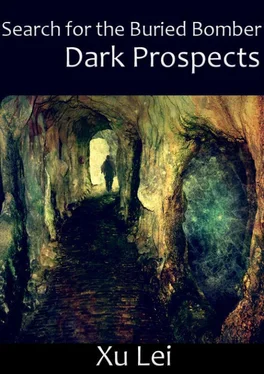Putting it simply, he said, the Würzburg Giant is a kind of tracking radar the Japanese imported from Germany. Its main function was to automatically control searchlights during nighttime air defense. While in China, the Japanese hadn’t needed such advanced nighttime tracking technology, so you don’t see too many of them. Most were set up on the Inner Mongolian and Pacific Ocean fronts. China later unsuccessfully attempted to copy the device’s design. The technology eventually died out, but during the war it was the most advanced tracking equipment around. Old Tang said that he too had been shocked to come across a shadow this large, but the thing itself was probably not as big as it looked. Different thicknesses at different layers of the ice distorted the images below. The device would have been used for guided navigation, though this one might be just a spare. Precision guidance would have been a necessity for flying a plane down here.
Wang Sichuan asked Old Tang what they planned to do with the thing once they dug it up. Could this have something to do with the telegram?
“It’s more than just that,” said Old Tang. He pulled a piece of paper out of his pocket. On it were several rough pencil sketches. Old Tang’s group had been searching the icehouse, looking for the caisson controls and attempting to gain a preliminary understanding of the place. The sketches were representations of the icehouse’s layout. The compression engines and electrical circuits that surrounded the room were all marked. The shadows beneath the ice had also been clearly noted. Old Tang pointed to several spots with his pencil. “The shells that you mentioned are vast in number and spread all around the icehouse, forming a ring. In the center is the Würzburg Giant. Look at these lines here. These ladderlike shadows are the tracks used to transport the device. We also found four black shapes alongside the Würzburg Giant, each the size of a PLA truck. Those are probably the two groups of searchlights that accompany it.” I nodded and he continued. “This doesn’t seem extremely odd to you? Placing a guided navigation radar device at the center of a ring of bombs? What’s the point of it?”
I was already much too cold to think. Wang Sichuan sneezed and said, “Could it be a trap?”
I understood what he meant. After engineering corpsmen lay land mines on the battlefield, they set up some phony target to get the enemy to approach. If the fuse covers on all these bombs had in fact been removed—meaning they were poised and ready to explode—then Wang Sichuan’s suggestion did seem fairly reasonable. But a radar device in the middle—what kind of bait was that? Who were they hoping to attract? Then again, maybe they’d wanted to guide the plane to smash into the dam, destroying everything.
This didn’t make any sense, but I lacked the strength to consider it any further. The icehouse was too cold. I could endure it no longer. Old Tang told us to go back to the warehouse, saying that if we really wanted to help, we could go assist Old Cat. After returning to camp, we drank several cups of hot water and didn’t want to go anywhere. Something didn’t seem right. I began to feel increasingly uneasy.
Then it occurred to me: perhaps the reason the Japanese abandoned this place wasn’t as simple as we had thought. Nowhere in this entire system of rivers and caves had we seen any evidence suggesting the Japanese had tried to destroy the base. Everything had been left in good order. A great quantity of supplies remained neatly stacked and essentially unblemished. Even the various files and documents were left intact. We’d found a pilot’s corpse within the Shinzan, but where were the other members of the flight crew? Why had the corpse been left in the pilothouse? I don’t know whether the cold from outside had penetrated the warehouse or if my thoughts were just that unsettling, but I began to shiver uncontrollably. I still remember that feeling. It wasn’t fear, just the shock piled on shock of limitless discoveries coming to light one after the other. A thought flashed across my mind. What if this base had already been abandoned by the time the Shinzan flew back?
There must have been something strange about my expression, because both Wang Sichuan and Pei Qing were looking at me oddly. Wang Sichuan asked whether it wouldn’t be best for me to sleep a little longer. When one’s body is in revolt, he said, it isn’t wise to push it.
I shook my ahead. “What do you guys think?” I asked them. “How long did that Shinzan fly around the abyss before it returned?”
“What do you mean?” asked Wang Sichuan.
“Is it possible,” I continued, “that after the Shinzan flew into the abyss there was some kind of emergency up here and everyone was forced to leave, so that when it flew back out there was already no one left? With no guidance from the ground, the pilot would definitely crash. His corpse was then left behind in the wreckage of the plane, while those still living among the flight crew disappeared to who knows where.”
The problem was that I had no idea how long a Shinzan could stay aloft. Later, I checked. Flying at full speed, it could cruise for ten to fourteen hours. Given that this base spanned the entire cave system, evacuating it would take at least one hundred hours. But Wang Sichuan wasn’t one for details. He agreed that it seemed reasonable enough. Pei Qing wasn’t so sure. “Based on the way the place looks,” he said, “it hardly seems as if there was an emergency. They didn’t dismantle the transmitter. Even the codebook was left behind. Even with an army on their doorstep, they wouldn’t have behaved so carelessly.”
It felt not like they’d evacuated, but as if everyone on the base had suddenly disappeared. Old Tang had said something like this as well. It seemed like the Japanese had planned on returning, he’d said. It was as if they were only handing the base over temporarily, but then they’d never come back. Something beyond our imaginations had happened here. The state of this base in its final dozen or so hours remained absolutely unfathomable. And it seemed highly likely that whatever had happened, it didn’t begin until after the Shinzan flew into the abyss.
The more I thought about it, the less I understood. After standing back up, I went to look at the sand table, hoping to draw some clue from it. Then Wang Sichuan suddenly let out a quizzical “Huh?” He raised his head and began to look around. I did the same, only to discover that he wasn’t looking, he was listening. From someplace far overhead, the air-defense warning rang out once more. It was a deep sound and very faint. If you didn’t listen closely, it was easy to mix up with the noise from the exhaust fan.
Pei Qing looked at his watch. The alarm continued to ring for a long time, then all of a sudden it stopped. He relaxed. “It rang for three minutes. This means the state of warning has been canceled.”
I breathed a sigh of relief. Buddha preserve us, I said to myself. Things up top are finally getting better. Before I could finish my thought, there came a great noise of machinery springing to life. The sound was all around us, now rising, now falling, seeming to resound from every corner of the dam. Several young soldiers rushed animatedly from the recesses of the warehouse. Good news, they told us. The dam had finished releasing the floodwater. Now, they believed, the mist would soon retreat below the warning line.
Wang Sichuan was about to ask how they knew this when there was a commotion over by the entrance to the icehouse. Several of Old Tang’s soldiers appeared, carrying some object. They called out for us to help. The thing was terribly heavy. Even with four of them carrying it, they were barely doing more than dragging it along the ground. We hustled toward them. It was a great chunk of ice, the size of a coffin. Wang Sichuan shouted for me to hurry up. Gritting his teeth, he put his hands underneath it and together they lifted it off the ground. Pei Qing and I tried to help, but the privates told us they were OK. More were coming, they said. Another group of soldiers hefting a second slab appeared only a moment later. I called some of the others over and, giving it all we had, we lifted it up. It felt uncommonly heavy. Then I saw something was frozen inside.
Читать дальше












